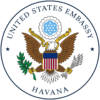
- Sponsors Type
- Federal/National
- Country
- Cuba
Contact Info
- Phone
- (53)(7) 839-4100
- Address
- Calzada between L & M, Vedado, Havana, Cuba
Last modified on 2024-06-19 01:45:23
Description
U.S. Embassy in Cuba
Sponsor Relationship
U.S. Embassy in Cuba is a part of:
No sponsor in our database are part of U.S. Embassy in Cuba.
Most Recent Grants from This Sponsors
No grants from this sponsor remain active at the moment.
Deadline Approaching Grants
No grants from this sponsor have deadline within a month period.
